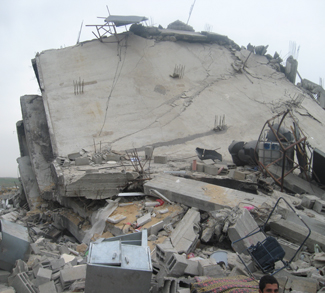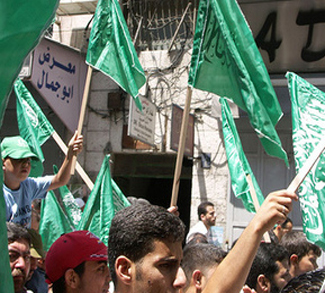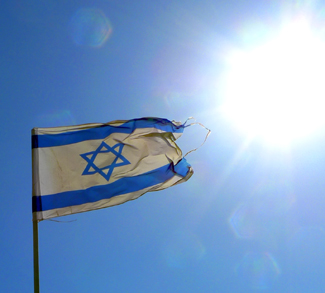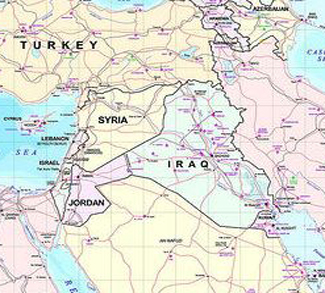FORECAST
The 2008-2009 Israel-Hamas War enters its second week, with no signs of letting up any time soon.
Israel continues to ferociously attack the Gaza Strip from the air, killing approximately 437 Palestinians, including scores of civilians, and injuring about 2280 more. Israeli fighter and bomber jets have flown more than 500 air sorties against Gaza since the offensive began just after Christmas, while Israeli attack helicopters have flown hundreds more.
Israel also launched a ground offensive late on Saturday after recalling almost 10,000 reservists and amassing Israeli tanks on the Gaza border.
Meanwhile, Hamas and other militant Palestinian groups have fired more than 400 crude, homemade rockets into southern Israel, killing 4 Israelis and injuring over 30.
As the conflict enters its second week, the key questions are when and how will it end?
The first attempt at trying to end the war came a few days into the conflict, when Israeli and American sources floated the idea, with French backing, that Israel was considering suspending its attacks for 48-hours. However, the truth behind that proposal was that Israel was concerned that the Gaza Strip was scheduled to be under heavy cloud cover for those 48 hours, restricting Israeli warplanes’ visibility while simultaneously providing Hamas rocket teams with cover.
Israel had hoped that Hamas would fall for the bait, keeping Israel safe from Hamas rockets for 48 hours, after which Israel (perhaps with help from the Fatah group) would “engineer” a few rockets designed to ‘break the truce’, allowing them to re-launch its offensive in clearer weather.
Nonetheless, Hamas refused to take the bait, and Israeli officials distanced themselves from the proposal.
Yet during those 48 hours, Hamas and allied militant groups were practically ineffectual against Israel, emboldening Israel and condemning the two sides to a protracted conflict.
The clearest signal that Israel intended not only to continue the conflict, but to escalate the clash into a ground war, is that on Friday, Israel began to allow Palestinian women and children with dual foreign citizenship out of the country in an effort to avoid foreign citizens amongst the expected casualties following a ground incursion.
Israel’s concern for world opinion has risen sharply as worldwide protests have erupted across the globe. Israel is facing serious criticism for launching a war against the Palestinians with such ferocity. Even sympathizers are calling Israel’s attack disproportionate, fueled by Israel’s decision to target civilians and civilian infrastructure, including fuel depots, manufacturing factories, mosques, office buildings, as well as the tunnels that represented the only lifeline available to the Palestinians to survive through Israel’s suffocating blockade.
Indeed, Israel’s war on Palestine has received global condemnation, with the exception of Canada and the United States.
But it is the complicity of Israel’s neighbours that will allow Israel to radically escalate the violence. Although Israel’s Arab neighbours have allowed street protests, none have come to the aid of the besieged Palestinians. In fact, Egyptian dictator Hosni Mubarak has gone so far as to blame Hamas for Israel’s war, igniting a fierce anti-Egyptian backlash across the region.
Even those most sympathetic to the Palestinians, like Hezbollah in Lebanon, have merely voiced verbal condemnation – Hezbollah, now a part of the Lebanese government, will not risk its stake in the Lebanese power structure (a stake obtained after decades of struggle) by confronting a still superior Israeli army.
Not even fellow Palestinians have allowed more than a verbal condemnation. In fact, on Saturday, Palestinian President Abbas’ Fatah group violently suppressed a sympathy protest organized by Hamas activists in the West Bank.
With Israel’s neighbours providing a ‘green’ signal for Israel to “cleanse” Gaza, there is little chance the war will end any time soon.
Yet Israel has floated a new suggestion that is being echoed by the UN and appears to have the backing of major Western powers: the imposition of international monitors in Gaza.
If the war does end with international monitors in Gaza supervising a truce, expect that truce to include a major scale down of the Israeli blockade of the Gaza Strip.
And if that is the true end game of this conflict, then both political parties that launched this war, Kadima and Hamas, stand a good chance of achieving their primary objective: winning the early 2009 democratic general elections over the corpses of hundreds of Palestinians and dozens of Israelis.
SUMMARY OF EVENTS: December 29, 2008 – January 5, 2009
WORLD
Crude prices rose above $40 a barrel Monday as Israel and Palestinian militants exchanged rocket fire and the death toll mounted in the oil-rich region.
NORTH AMERICA
United States
The Justice Department this week released Attorney General Michael Mukasey’s recommendation that President Bush invoke executive privilege in refusing to release to Congress transcripts of Dick Cheney’s conversations with the FBI.
2008 saw the greatest financial losses in generations, as $6.9 trillion poured from investors’ coffers in the worst series of cascading disasters since the Great Depression.
The U.S. Securities and Exchange Commission, which sued Bernard Madoff last month for allegedly directing a $US50 billion ($71 billion) fraud, is to withhold public access to a list of his assets filed on Wednesday.
As Israeli warplanes continue to bomb Gaza, attention is turning to the role of American-made weapons in the deadly attacks, which have now killed over 400 and wounded 2000, including many civilians.
WESTERN EUROPE
Iceland
A nationally televised meeting between Iceland’s prime minister and other political leaders was forced off the air Wednesday night when angry protesters disrupted the broadcast.
EASTERN EUROPE
The European Union (EU) called on Friday for immediate resumption of full deliveries of gas to its member states after Hungary and Poland suffered reduced supplies due to Russia’s dispute with Ukraine.
Georgia
Georgia is moving tanks and armored vehicles closer to the border with South Ossetia, the Georgian breakaway republic said Monday.
Russia
Russian Prime Minister Vladimir Putin warned Ukraine on Wednesday of “severe consequences” if it disrupted gas supplies to Europe, as another New Year’s Eve energy dispute went down to the wire.
Russia cut off natural gas supplies to Ukraine on Thursday after last-ditch talks on a 2009 contract failed late on Wednesday, but increased shipments to other European states, gas monopoly Gazprom said.
MIDDLE EAST
Iran
Iran’s Air Force is on alert after the country’s president envisaged major regional developments in the wake of the Israeli raids on Gaza.
Iraq
U.S. forces in Iraq came under an Iraqi mandate on Thursday, an event the country’s leader said had finally restored Iraq’s sovereignty nearly six years after the invasion that toppled Saddam Hussein.
Israel
Israeli warplanes pounded the Hamas-ruled Gaza Strip on Saturday, killing at least 229 people in one of the bloodiest days for the Palestinians in 60 years of conflict with the Jewish state.
Israel Monday expanded its fiercest air offensive in the Hamas-ruled Gaza Strip in decades and prepared for a possible ground assault after a three-day bombardment that has killed more than 300 Palestinians.
Israel bombed Gaza for a fourth day on Tuesday, warning the blitz that has killed at least 360 people could last for weeks, as Hamas fired back with deadly rockets landing deep inside the Jewish state.
Israel rejected calls for an immediate ceasefire in the Gaza Strip on Wednesday after Hamas rockets hit an Israeli town and Palestinians endured more air strikes on the last day of 2008.
Israel killed a senior Hamas leader in an air attack on his home on Thursday, striking its first deadly blow against the top ranks of the Islamist group in a Gaza offensive that has claimed more than 400 Palestinian lives.
After a week of air strikes on Hamas targets, leaving an estimated 420 dead and scores more injured, Israel is poised to launch what’s said to be a “major ground offensive” into the Gaza strip.
SOUTH ASIA
Pakistan
Pakistan urged India on Tuesday to reduce tensions by deactivating its forward air bases and standing down troops, but New Delhi angrily rejected suggestions it was aggravating tensions with its nuclear-armed rival.
Pakistan suspended supplies going to foreign forces in Afghanistan on Tuesday as security forces launched an offensive against militants in the Khyber Pass region, a government official said.
A leader of a banned Pakistani Islamist militant group has confessed to being a main planner of the attack on Mumbai, the Wall Street Journal reported on Wednesday, citing a Pakistani investigator.
A suspected U.S. drone fired two missiles on Friday in Pakistan’s South Waziristan region killing at least three people in an area known as a stronghold of Pakistani Taliban commander Baitullah Mehsud.
Thailand
Supporters of former Thai Prime Minister Thaksin Shinawatra vowed on Wednesday to resume their street campaign in the new year to pressure the new government to call fresh elections.
AFRICA
Egypt
Egypt “collaborated” with Israel in its Gaza attack and lulled Hamas into thinking the Israel Defense Forces would not attack Gaza, the London-based Arabic-language newspaper al-Quds al-Arabi reported Sunday.
Somalia
For several years the U.S. military has fought a covert war in Somalia, using gun ships, drones, and Special Forces to break up suspected terror networks, and enlisting Ethiopia’s aid in propping up a pro-U.S. “transitional” government, however this relatively unknown front in the “war on terror” is where the U.S. and its allies are losing ground, fast.
Manjit Singh is a contributor to Geopoliticalmonitor.com




